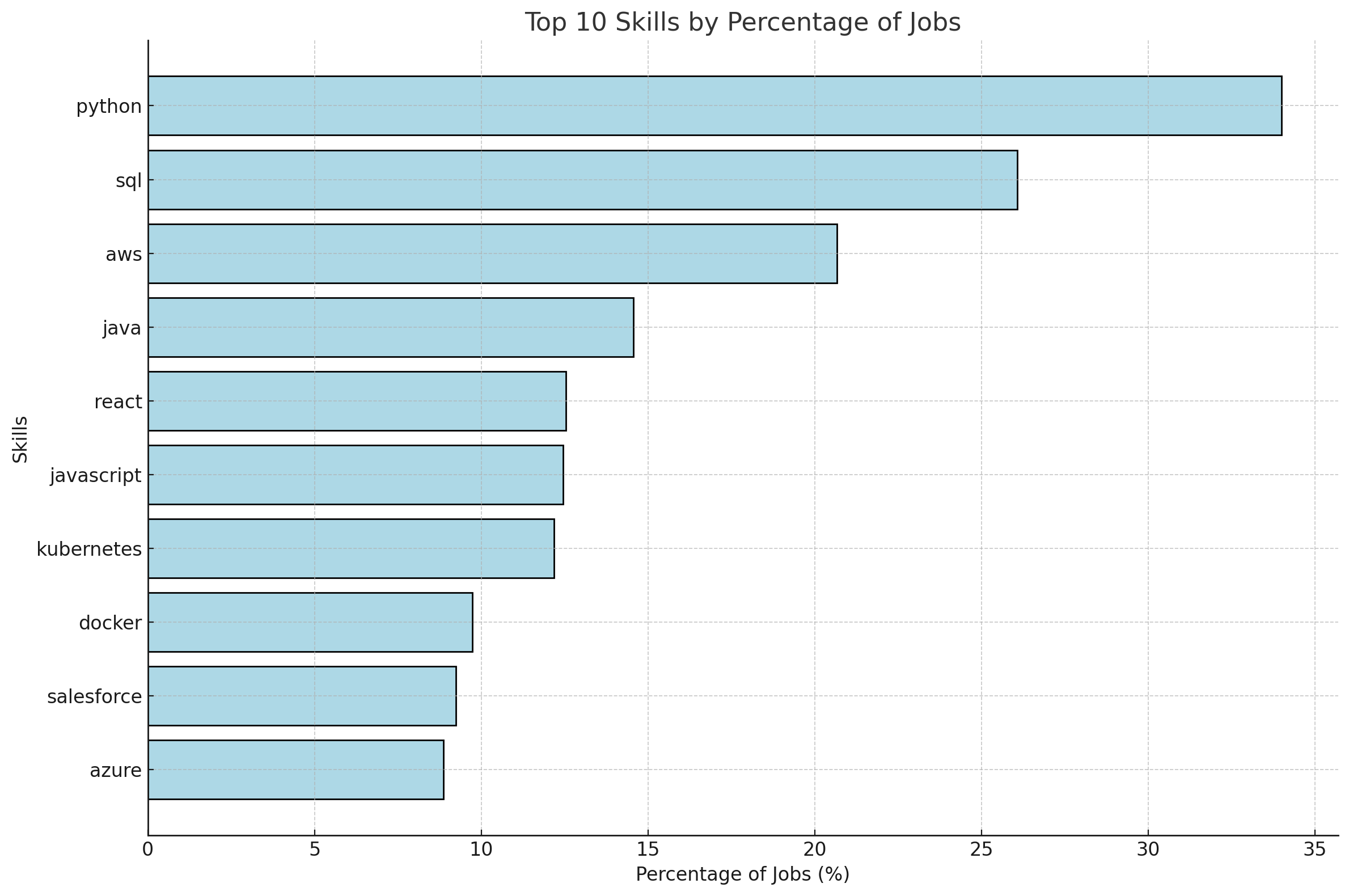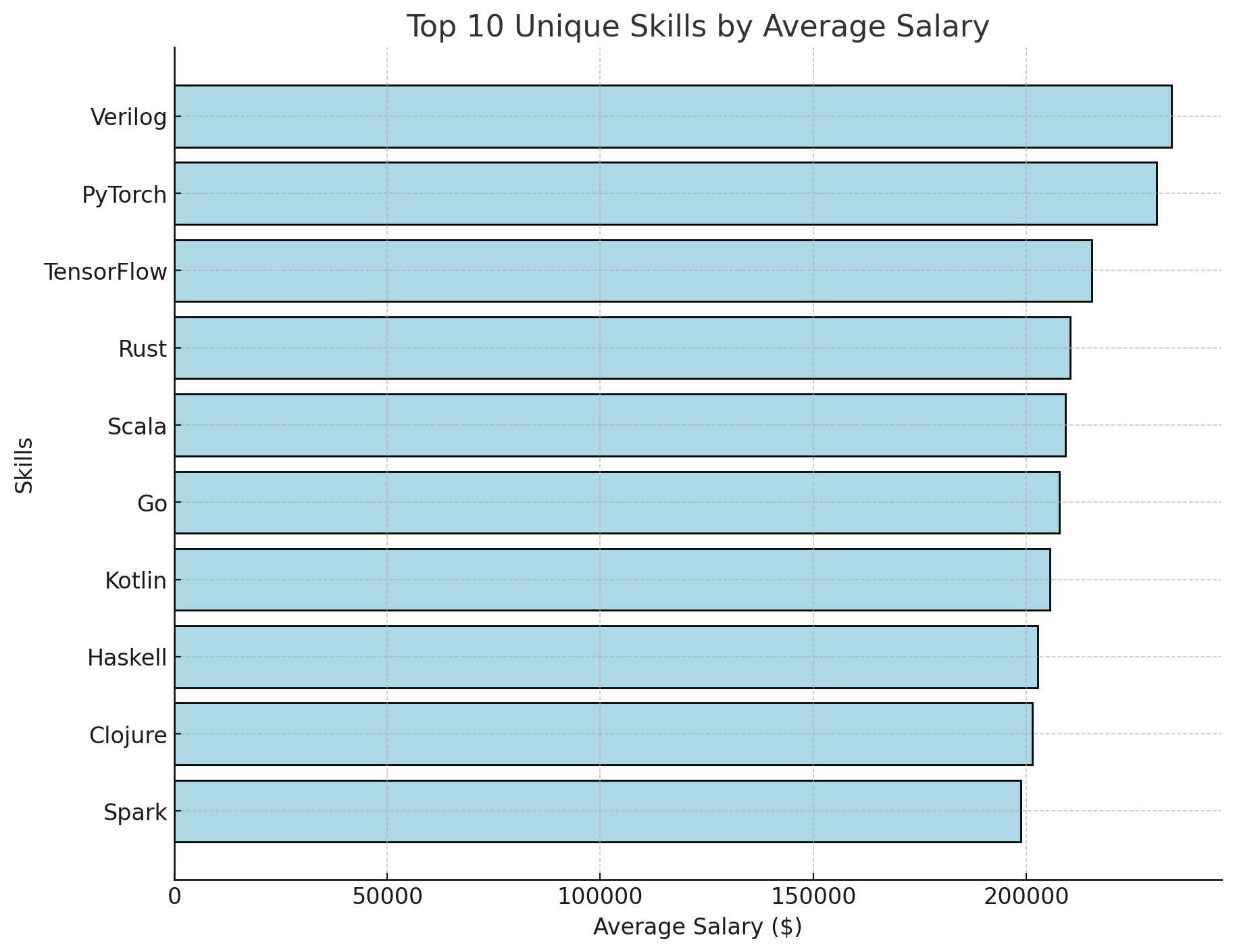Top-10 skills of Remote Software Engineers for 2025
Hey,
I'm Sergio Pereira, and this is the Remote Work newsletter 👋
Last week I wrote the ultimate guide to Remote Work Contracts, for everyone wondering about contracts, taxes and visas, as they look for a remote job.
Today I'm writing a data driven article. I analysed ~250k+ jobs from this week's scrape of JobsCopilot.ai.
The job market moves fast, and many people are anxious about being laid off or seeing their job replaced by AI. In this article I'm using hard data to tell you the skills that are most in-demand right now.
For the data enthusiasts, the TL;DR of the methodology:
• I scrape the careers pages of ~400k companies (the weekly batch job at JobsCopilot).
• I queried this week's new job openings from that DB (~250k jobs).
• I filtered out all on-site jobs.
• I clustered jobs that are within Software Engineering, and filtered out all others.
This left me with ~60000 jobs, which I queried to figure out the Top-10 skills of Remote Software Engineers.
However, I quickly realised that Top-10 Skills is actually subjective:
• Some people want to know the skills with highest number of jobs.
• Others want to know the skills with the highest salaries.
So I'm making 2 distinct Top-10 Skills lists, one by number of jobs, and another one by salary. Here they go:
Top-10 Skills (by number of remote jobs)
Here I highlight the skills most frequently required in remote software development job listings.

- Python
Appeared in 33.99% of software development job listings. And the most frequent secondary skills in jobs that require Python are: SQL, AWS, Java, Kubernetes, Docker.
Example job from JobsCopilot DB: Platform Engineer @ Lumos ($210k - $240k) - SQL
Appeared in 26.08% of software development job listings. And the most frequent secondary skills in jobs that require SQL are: AWS, Java, JavaScript, Kubernetes.
Example job: ML Researcher @ Launch Potato ($110k - $160k) - AWS
Appeared in 20.67% of software development job listings. And the most frequent secondary skills in jobs that require AWS are: Python, Kubernetes, Docker, Java, SQL.
Example job: Infrastructure Engineer @ Novi ($100k - $150k) - Java
Appeared in 14.56% of software development job listings. And the most frequent secondary skills in jobs that require Java are: Python, AWS, SQL, Go, Kubernetes.
Example job: Software Engineer @ Meronome ($150k - $217k) - React
Appeared in 12.54% of software development job listings. And the most frequent secondary skills in jobs that require React are: JavaScript, AWS, Python, TypeScript.
Example job: Software Engineer @ Invisible Labs ($175k - $220k) - Docker
Appeared in 11.23% of software development job listings. And the most frequent secondary skills in jobs that require Docker are: Kubernetes, Python, AWS, Java, SQL.
Example job: Software Engineer @ EpiSci ($100k - $190k) - JavaScript
Appeared in 10.47% of software development job listings. And the most frequent secondary skills in jobs that require JavaScript are: React, TypeScript, Node.js, SQL.
Example job: Code Wrangler @ Automattic ($70k - $170k) - Kubernetes
Appeared in 9.67% of software development job listings. And the most frequent secondary skills in jobs that require Kubernetes are: Docker, AWS, Python, SQL.
Example job: Site Reliability Engineer @ Bondex ($80k - $120k) - TypeScript
Appeared in 7.89% of software development job listings. And the most frequent secondary skills in jobs that require TypeScript are: JavaScript, React, AWS, SQL.
Example job: Software Engineer @ Cinder ($165k - $235k - Node.js
Appeared in 7.45% of software development job listings. And the most frequent secondary skills in jobs that require Node.js are: JavaScript, TypeScript, React, AWS.
Example job: Fullstack Developer @ MarsBased (€45k - €55k)
This Top-10 Skills by number of jobs wasn't a surprise for me, I reckon. Having hired over thousand people through the last decade for Software Engineering roles myself, as a CTO, I know the in-demand skills.
If anything, Python is growing very fast as a result of the ongoing AI wave that demands lots of data work (for which Python is the best tool). Also, Javascript and it's frameworks (Node, React, etc) while still widely popular, are losing some popularity, and no longer dominate the market as much as in the recent past.
Now let's see the Top-10 by salary:
Top-10 Skills (by salary)

Here I highlight the skills that drive the highest average salaries in remote software development roles.
- Verilog
Average Salary: $234,168
Median Salary: $242,000
Maximum Salary: $333,700
Example job: SoC Design Engineer @ Google ($127k - $187k) - PyTorch
Average Salary: $230,668
Median Salary: $230,000
Maximum Salary: $365,400
Example job: Dataset Engineer @ RunwayML ($260k - 320k) - TensorFlow
Average Salary: $215,427
Median Salary: $220,000
Maximum Salary: $385,000
Example job: ML Researcher @ Splice ($165k - $206k) - Rust
Average Salary: $210,404
Median Salary: $215,000
Maximum Salary: $403,000
Example job: Infrastructure Engineer @ Luminai ($170k - $250k) - Scala
Average Salary: $209,256
Median Salary: $210,000
Maximum Salary: $400,000
Example job: ML Engineer @ Capital One ($140k - $159k) - Go
Average Salary: $207,840
Median Salary: $205,000
Maximum Salary: $390,000
Example job: Software Engineer @ Cloudflare ($137k - $240k) - Kotlin
Average Salary: $205,492
Median Salary: $200,000
Maximum Salary: $380,000
Example job: Software Engineer @ Suno ($170k - $240k - Haskell
Average Salary: $202,678
Median Salary: $201,000
Maximum Salary: $375,000
Example job: Haskell Engineer @ Kadena ($120k - $180k) - Clojure
Average Salary: $201,444
Median Salary: $200,000
Maximum Salary: $370,000
Example job: FullStack Developer @ SIG ($95k - $135k) - Spark
Average Salary: $198,765
Median Salary: $197,500
Maximum Salary: $365,000
Example job: Engineering Lead @ Hubspot ($197k - $316k)
This Top-10 really surprised me. Verilog comes on top, despite being a relatively unknown language for most us, software folks. It's a hardware description language, used by chip manufacturers, and especially popular in the US. Despite having way fewer jobs than say Python of Java, Verilog has really high salaries which suggests there's much more demand than supply at the moment.
Besides Verilog, most of the other highest paying skills are related with data analysis and machine learning. This Top-10 is clearly influenced by the hot AI market we're living in these days. If you're wondering what's the next skill you should learn, probably a good call to pick from this list.
Also a quick note: For salaries I used the upper value for the jobs that provide a salary range, thus them looking a bit high in this comparison. Next time I'll use averages.
This is it, now you know which of your skills are most in-demand, and you also know which skills you should learn next to get to increase your market value even more.
Now you're ready to search for that remote job you're dreaming of. JobsCopilot.AI can be your Swiss army knife, since it pulls over 50k remote jobs every week. In fact, the Jobs Copilot finds you the jobs and it also applies on your behalf to the jobs you select. It's automated by AI agents, you're in the supervisor's seat to simply review the application process. No more grunt work scrolling job boards and filling application forms.
This is how the JobsCopilot works:
1/ Your auto-application profile
Once you switch to the Premium plan, you'll be prompted to fill in a profile section with your replies to common demographic questions found in job application forms:

2/ Your auto-apply flow
Besides that initial setup, you'll now find this new button in the jobs card. Just click the "Auto Apply" button on the jobs that are relevant to you, and that will trigger the auto-apply backend flow (no application is sent before your final revision):

3/ Application form is fetched and pre-filled for you
All jobs you've ticked "Auto Apply" are moved to the "Jobs to Apply" tab. And for each of them our backend pulls the application form, and our AI generates replies to each of the form questions based on the job description and your profile. Within a couple minutes you can find the pre-filled job application form in each job card:

4/ One-click confirmation
For now, I'm requiring you to review and click this submit button for every job, as I want you to feel in control of your applications, and I want to capture feedback on quality of this flow. I might make it more automated upon some configs in the future.
Once you submit a job for Auto Apply, the copilot will submit your application in the following minutes/hours (depending on work load). You'll get these messages on your email on a frequent basis, like I'm receiving on a daily basis:

Developing JobsCopilot under such aggressive bandwidth constraints has been hard work, but I'm thankful for your feedback, and for all positive messages and engagement from the almost 500 people using it on a daily basis. You truly are an amazing bunch :)
In case you're interested, I've just setup the JobsCopilot Affiliate program. Just signup, share with your community, followers and friends and you'll get a 30% lifetime revenue share.
Thanks for reading this newsletter until the end. You can read all past editions here. Make sure to share it with your friends and colleagues so they can read it too.
See you next Friday,
Sergio Pereira,
Startup CTO & Remote Work Lover


